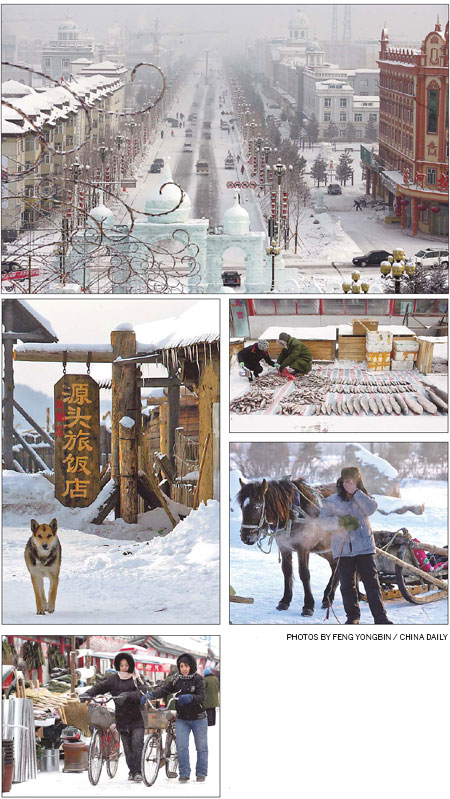Capturing life in China's north pole
|
Clockwise: A bird's-eye view of Mohe's main avenue, Zhenxing Street, on a typical December morning. The county had a population of 100,000 as of December 2010.? A fish vendor at Beichui Market braves the -35 C weather.? Despite the arctic temperatures, the market attracts numerous vendors who prefer to conduct business outdoors.? A resident of Beijicun, Mohe's northernmost village, waits to ferry tourists visiting the border lookout to Russia. Sleighs are the most common means of transportation in places outside the county seat.? Beichui Market is a favorite shopping destination for essentials like meat, fruit, bread, boots and snow shovels. A visit to the market is an ideal way to get to know locals.? Luoguhe village, located near the mouth of the Heilongjiang River that borders Russia, is a popular summer boating destination. In winter its streets are almost deserted. |
What is life like in deep winter at Mohe, one of China's coldest cities? Tiffany Tan and photographer Feng Yongbin came back, thawed out and filed these impressions.
'It's -40 C here today," my tour guide said in an unsettling tone on the phone from Mohe. It didn't help to hear that one of our reporters in Harbin, the capital of Heilongjiang province and home of the Snow and Ice Festival, considered it too cold to join our team further north.
Mohe, the northernmost county, is dubbed "China's North Pole" and holds the distinction of having experienced the nation's lowest recorded temperature of -52.3 C in 1956.
If people born and bred in the north-east find Mohe unbearably cold, how then would I fare - being more familiar with Southeast Asia's hot and humid climate?
My fears were allayed with expert advice and research online. The key lies in layering warm clothing to allow air to circulate. I ended up packing six layers of clothing, and the shopping bill almost equaled the cost of the round-trip ticket.
But I decided being destitute was better than being frostbitten.
The first thing that struck our photographer, Feng Yongbin, and me were the prickly icicles that formed around our nostrils with each breath. He took to wearing a face and nose mask, but I passed on the cotton covering since it fogged my glasses, making me almost blind.
The excruciating cold presented distinct challenges to reporting. It made thinking and speaking unbelievably difficult, froze the ink in our ballpoint pens and rendered cameras and cell phones unusable at critical moments.
"I'm trying to massage my camera's battery back to life," Feng said when I asked if we had adequate pictures at the northernmost border lookout to Russia.
I couldn't even record the names of my interviewees at times. I couldn't move my fingers under my bulky ski gloves, but if I took them off my fingers immediately become frozen.
But underneath the physical challenges lay important insights into life at Mohe. The simpler joys were magnified - family and friends, food, shelter.
"Just going indoors is already the biggest satisfaction in the world," said Feng.
(China Daily 01/09/2011 page6)





















